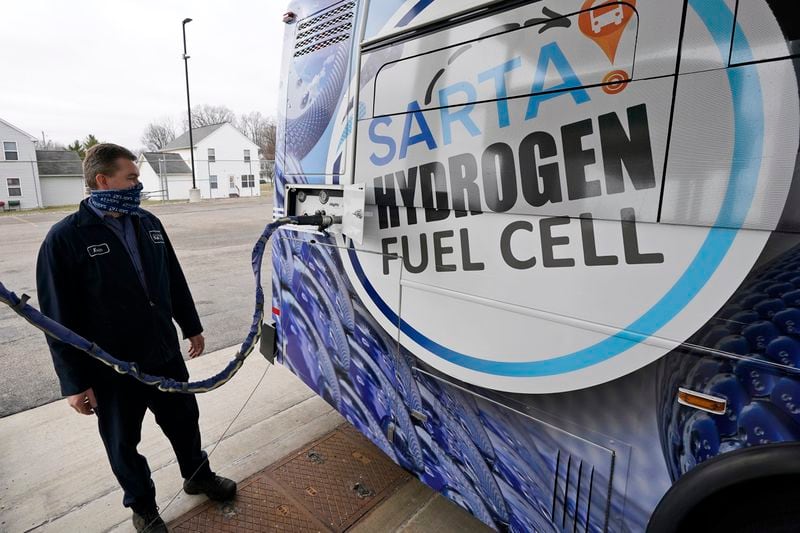As Gov. Brian Kemp and a delegation of political and business leaders crisscrossed South Korea for a trade mission that ended this week, they traveled in a hybrid electric bus powered by a hydrogen fuel cell.
At a visit to a Hyundai Motor Group track, they tested a zero-emission hydrogen engine that could disrupt the electric vehicle market. And in sit-downs with Korean leaders, including the president, they discussed how emerging technologies could reshape the industry.
In an interview, Kemp said the “futuristic” hydrogen developments could become a key part of Georgia’s growing economic ties with South Korea, which has invested billions of dollars in electric vehicle, battery and other projects in the state.
“It was good for us as policymakers to see what the next wave of innovation is going to be,” Kemp told The Atlanta Journal-Constitution on Thursday after returning home from the 10-day mission.
While hydrogen has been hyped for years as an energy source that could help wean parts of the global economy off fossil fuels, progress has been slow and unlocking hydrogen for use as fuel often results in emissions of carbon dioxide and other greenhouse gases.
The governor said he was optimistic that Georgia can play a key role in the industry’s growth despite losing a bid last year to land a federal hydrogen research hub. He said local and federal leaders can learn much from how South Korea has embraced the energy source.
Credit: Courtesy photo
Credit: Courtesy photo
“Just making sure we’ve learned from past mistakes that we’re seeing right now, trying to push things too fast and getting ahead of the supply chain – like what’s happened on electric vehicles,” said the Republican, who has echoed his party’s criticism of federal green energy incentives that he said have created an “uneven playing field.”
“To see what they’re doing in South Korea in this market, it’s very helpful to understand that,” Kemp added.
‘Very loud’ about hydrogen
Georgia’s emergence as an electric vehicle and green energy manufacturing center has come in large part through Korean investments.
Economic between the Peach State and Korea go back decades. Korea opened a consular office in Atlanta in 1976. About a decade later, Georgia opened a trade office in Seoul. It wasn’t until 1996 that Georgia landed its first major Korean manufacturer in Covington.
Within the past 20 years, the state landed the Kia Motors factory in West Point, and more recently the $7.6 billion Hyundai electric vehicle factory near Savannah and multibillion-dollar battery factories in Jackson and Bartow counties.
Despite missing out on the federal hydrogen research hub, the state has inked a hydrogen research partnership between Hyundai and Georgia Tech and started planning for a hydrogen supply chain to fuel trucks that will run between Hyundai’s EV factory and the Savannah port.
Credit: AP
Credit: AP
Hydrogen is the most abundant element in the universe, but it rarely exists on its own on Earth.
To be used as a fuel, it needs to be isolated from other compounds that contain it. While trucks powered by hydrogen produce far fewer tailpipe emissions, reducing greenhouse gases that contribute to climate change, the environmental benefits depend on how the hydrogen is produced.
“Green” or “clean” hydrogen is produced using renewable energy, but the vast majority of the hydrogen produced today is derived from fossil fuels.
Executives at Hyundai have announced a wide-ranging ranging vision for using hydrogen logistics in Georgia — including producing hydrogen from organic waste such as food, sludge and manure, and using hydrogen to fuel everything from buses to power generators to aircraft.
Located about 30 minutes from the state’s Savannah port, the future Metaplant could be the catalyst to spur a hydrogen transportation network across Coastal Georgia, said Georgia Department of Economic Development Commissioner Pat Wilson.
“Hyundai has been very loud with how they want to focus on green logistics,” he said. “They are very in favor of using hydrogen-powered vehicles to move their products around.”
‘Hot prospects’
Hydrogen also factored into his conversation with President Yoon Suk Yeol, who encouraged Kemp to continue to foster Korea’s energy business in Georgia.
“He understands the great economic ties that the state of Georgia has with the Republic of Korea and how important it is from an economic standpoint and a national security standpoint,” said Kemp, who described the meeting as productive.
“It went well. He wasn’t just talking about electric vehicles. He realizes what’s coming in hydrogen.”
Beyond meetings with Hyundai, the governor also met with executives from solar manufacturer Qcells, which has a pair of factories in Northwest Georgia and EV battery maker SK Battery, among others.
The governor also said he met with undisclosed “hot prospects” that could soon yield benefits.
“We still have a lot of opportunity there. We met with a couple of prospects when we were over there, a lot of our existing partners,” Kemp said. “I think we have some things we could do in the future with them. I was very optimistic about how the trip went.”
It was the governor’s second trade mission to South Korea, following one he led shortly after he took office in 2019. Returning to the Asian nation, he said, felt comfortable.
“When I was over there in 2019, I was really just trying to learn who these companies were and what they did,” he said. “And to go back now, with relationships that we have, it was like visiting your friends and your neighbors.”
-Staff writer Drew Kann contributed to this report.












